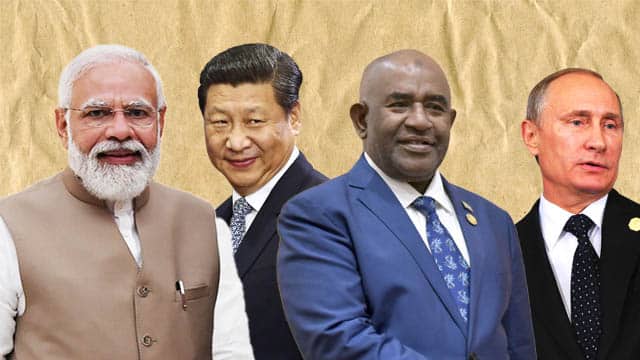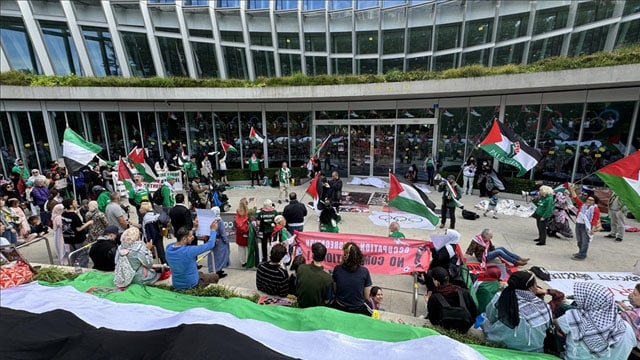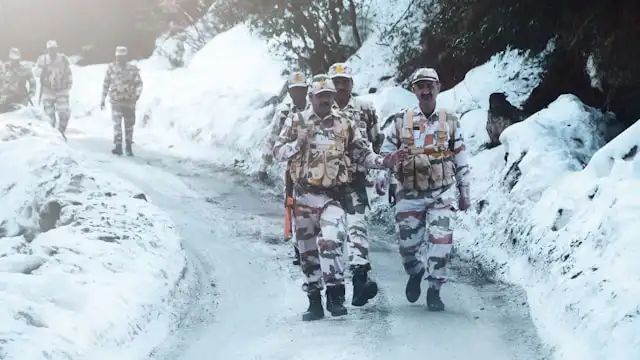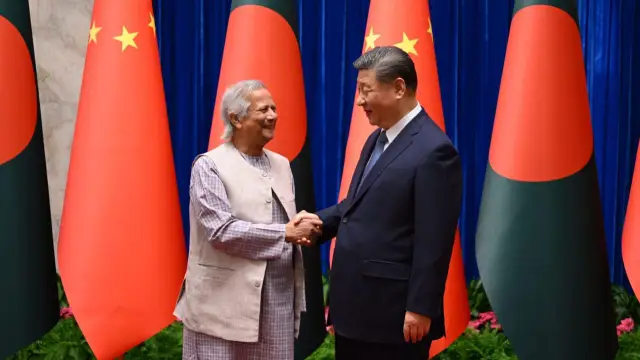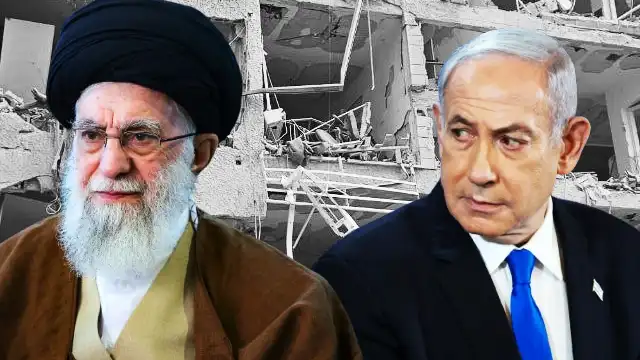India has reportedly lost to the China-Russia alliance during the recently concluded 15th BRICS Summit in Johannesburg. Prime Minister Narendra Modi’s government had reportedly raised concerns over BRICS expansion—a bloc of Brazil, Russia, India, China and South Africa—in an apparent bid to prevent China and Russia from turning it into an anti-western alliance.
However, New Delhi failed to achieve any success in its endeavour at the 15th BRICS Summit.
The summit paved the way for BRICS expansion, with the inclusion of six new member countries from the Global South –Argentina, Egypt, Ethiopia, Iran, Saudi Arabia and the UAE.
These six were chosen from among 22 countries that have formally applied for BRICS membership. Over 40 countries of the Global South have manifested their desire to join the bloc.
India has been raising its concerns over BRICS expansion, fearing it would weaken its clout on the five-country bloc. Apart from India, Brazil also had apprehensions on the inclusion of new members, however, for entirely different reasons.
India’s alleged opposition to BRICS expansion
Much before the 15th BRICS Summit started on August 22nd, speculations of India’s apprehensions over the bloc’s expansion plan started spilling out.
The opposition to the BRICS expansion went up to the summit itself, where a set of proposals on membership criteria by India created roadblocks to consensus among member countries.
India reportedly demanded that countries facing western sanctions shouldn’t be allowed in the BRICS. India also reportedly demanded a per-capita GDP threshold for applicants.
Such thresholds would have disqualified several countries of the Global South from becoming members of the BRICS and would’ve turned the bloc into an elitist one alike the Group of Seven (G-7).
Although Brazil also opposed BRICS expansion, its reasons were different from those of India’s.
According to Brazil, an applicant country should get its membership of the BRICS in stages, from an observer country to a partner country and then only a full-member state.
Brazil emphasised a similar model used by the Euro-Asian bloc – the Shanghai Cooperation Organization (SCO). It had argued that applicant Indonesia can be taken as a full member through such a route.
However, Modi apparently failed to garner support at the summit, as China, Russia and South Africa decided not to put any geopolitical or per-capita GDP conditions on the applicants.
The reluctance of the bloc to implement India’s conditions is exhibited in the inclusion of Iran, which faces the harshest western sanctions, and Ethiopia, an African country with a low per-capita GDP, into the BRICS.
India reluctantly agreed as Modi’s statements show. “India fully supports the BRICS expansion membership and welcomes moving forward on this based on consensus”, Modi said at the summit, taking a reverse turn on his earlier position.
“India has always believed that the inclusion of new members will strengthen BRICS as an organisation and provide new impetus to our collective endeavours. This step will further strengthen the faith of many countries of the world in the multipolar world order”, Modi said while welcoming the new countries to the bloc.
“I am pleased that our teams have come to an agreement on the guiding principles, standards, criteria, and procedures for expansion”, he added, without mentioning what are those.
India’s Ministry of External Affairs (MEA) spokesperson Arindam Bagchi denied that New Delhi objected to the BRICS expansion at the beginning of the month. He dismissed the reports as “baseless”.
“We have seen some baseless speculation that India has reservations against the (BRICS) expansion. This is simply not true”, Bagchi had commented on August 3rd.
“We have talked about India’s position on expansion and we have clarified our position in the past. As mandated by the leaders last year, BRICS members are internally discussing the guiding principles, standards, criteria and procedures for the BRICS expansion process on the basis of full consultation and consensus”, Bagchi had said.
At that point in time, the MEA had to clarify that there was no decision taken on the prime minister’s South Africa tour. Although Bagchi had rubbished the speculation that Modi may skip visiting the 15th BRICS Summit in Johannesburg, the MEA confirmed the plan much later.
Such an unusual delay in declaring the itinerary of the prime minister’s crucial tour pointed towards a lacunae in India’s expectations and reality.
The reasons behind India’s opposition to BRICS expansion
Apart from Brazil, India is the only country in the BRICS that has a bonhomie with the US and its western and far-eastern allies.
India is a member of the four-nation anti-China coalition named QUAD. Although India has denied that QUAD is an anti-China entente, the other members of the bloc including the US, Australia and Japan have indicated several times that it’s directed against Beijing.
Moreover, despite its growing bilateral trade with China, India has a long-term border dispute with its neighbour and competes with it in the race for regional hegemony.
Since a military skirmish at the Sino-India border that killed over 20 Indian soldiers in mid-2020, the bilateral relationship has suffered immensely.
To deter China’s ambitions in the region, New Delhi has strengthened its ties with Washington DC manifold, despite its friendship with Russia. This was exhibited during Modi’s maiden state visit to the US in June, where he bagged several military and technological deals from President Joe Biden’s administration playing the China card.
Due to India’s growing hostility with China and the non-resolution of the antagonisms between the two, the US has provided special immunity to India, leaving it out of the sanction net for trading with American foes like Russia.
In this scenario, it became imperative for Modi to stall the BRICS expansion according to the template set by China and Russia that aimed at further weakening the US-led West’s hegemony.
India’s foreign policy emphasises building a multipolar world order that’s not anti-western in character but accommodative, which is not what China and Russia seek.
Membership of more countries, especially Middle-East Asian countries like Iran, Saudi Arabia and the UAE, means the dominance of the petro-dollar in energy trading will also weaken as the BRICS’s New Development Bank (NDB) contemplates the floating of a common intra-bloc trading currency.
For India, a weakened West can have adverse geopolitical impacts as the China-Russia bloc will gain more muscle and New Delhi would lose its bargaining leverage, which is at present based on its border dispute with China.
These reasons led Modi to put stronger conditions for BRICS expansion. However, the inclusion of the six new countries and the exclusion of Bangladesh, on which New Delhi has a strong influence, shows that the attempt didn’t bear any fruits.
Modi vs Xi at the 15th BRICS Summit
A South African newspaper had reported that Modi refused to deboard from his official plane at the Johannesburg Airport on Tuesday, August 22nd, after learning that the government had sent a cabinet minister to welcome him, while President Matamela Cyril Ramaphosa and the top members of the government had earlier welcomed Chinese President Xi Jinping, who was on a state visit to the African country.
The report, which was rubbished by the MEA and the South African government, further claimed that upon learning about the matter, Ramaphosa sent South Africa’s Deputy President Paul Mashatile to welcome Modi. The prime minister reportedly deboarded only after Mashatile welcomed him.
While it’s shown as an ignominy for Modi, the South African government followed the separate protocols set for the head of state on state visits and the head of government on official visits. While Xi is the head of the Chinese state, Modi is the head of the government and wasn’t there in South Africa on a state visit.
Due to this reason, Xi, who later held bilateral discussions with Ramaphosa on China-South Africa relations and was awarded the highest award of the country, got a different treatment from the government vis-a-vis Modi.
Although there were speculations about Modi and Xi holding a bilateral dialogue during the sidelines of the 15th BRICS Summit, like their discussion during the G-20 Summit in November 2022, they didn’t have any formal discussion except for a few seconds of chatter on their way to the stage.
Modi allegedly avoided meeting Xi during the SCO summit that India chaired in July by holding an online meeting.
Now, there is a scope of the duo meeting at the G-20 Summit to be held in New Delhi in September 2023, where Xi is invited. However, in the current scenario, there is a bleak scope of any breakthrough in the bilateral relationships during their meeting.
The importance of BRICS for India
As an emerging global power with the world’s fifth-largest economy, India has set its goal of reaching a $3 trillion economy in a few years. For this, it needs to increase its foreign trade.
Keeping an ice-cold relationship with one of its largest foreign trade partners won’t serve any long-term purpose for India, except for aiding jingoistic rhetoric in its domestic political arena.
New Delhi has to balance its relationships with China-Russia and the US-led bloc, without becoming a pawn of any of the camps against another. However, India’s foreign policymakers must also realise the rapid geopolitical changes taking in the world and the growing demand for multipolarity.
Russia’s special military operation in Ukraine exposed the West’s inherent weakness and decaying military-diplomatic prowess. In this scenario, India must rely more on blocs like the BRICS and SCO, while trying to use them for win-win deals with all stakeholders, including China.
It’s, therefore, imperative that India emphasises strengthening its bonds with the BRICS members and aspirants seeking a multipolar world order so that it can carve out a firm space for itself in the fast-changing geopolitical matrix and retain diplomatic leverage vis-a-vis its neighbour China and old friend Russia.
Tanmoy Ibrahim is a journalist who writes extensively on geopolitics and political economy. During his two-decade-long career, he has written extensively on the economic aspects behind the rise of the ultra-right forces and communalism in India. A life-long student of the dynamic praxis of geopolitics, he emphasises the need for a multipolar world with multilateral ties for a peaceful future for all.



